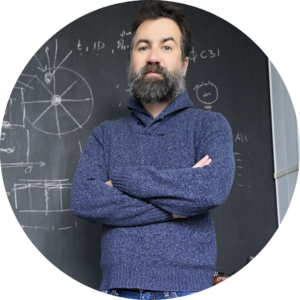
Antoine Adamantidis (CH), University of Bern – Moderator
Antoine Adamantidis is an Associate Professor in System Neurophysiology in the Department of Neurology at the University of Bern and the Director of the Zentrum Fur Experimentelle Neurologie (ZEN) at the Inselspital. He obtained his master and doctoral education at the Universities of Liege, Belgium, and trained as a postdoctoral fellow and a Research Associate at Stanford University School of Medicine, USA. Prof. Adamantidis’ research aims at investigating the wiring, firing dynamics and plasticity of the neural circuits regulating sleep-wake states in normal and pathological states using in vitro and in vivo optogenetics – a technology that he and his colleagues pioneered at Stanford University – combined to in vivo imaging and electro-physiological methods in mice. His laboratory identified brain circuits controlling sleep-wake states, sleep oscillations (slow waves, theta) and synaptic plasticity underlying memory consolidation and behavioural optimisation. His recent work identified a new mechanism for cortical plasticity in a healthy brain or during stroke recovery.

Sara Aton (USA), University of Michigan – Speaker
Sara Aton is an Associate Professor in the Department of Molecular, Cellular, and Developmental Biology at the University of Michigan. Her PhD research in circadian neurobiology was carried out at Washington University in St. Louis. Her subsequent postdoctoral fellowship at the University of Pennsylvania focused on sleep-dependent mechanisms for plasticity in the developing visual system. The current work of the Aton lab combines behavioural, transcriptomic, biochemical, chemogenetic and optogenetic strategies to explore sleep-regulated neural mechanisms for memory processing and synaptic plasticity.

Giorgio F. Gilestro (UK), Imperial College London – Speaker
Giorgio Gilestro studied medicine and biotechnology at the University of Torino, Italy, and graduated with a PhD in developmental neurobiology at the University of Vienna, Austria. In 2006, he started his research in the sleep field at the University of Wisconsin Madison and he joined the Imperial College London (UK) as an independent investigator in 2010. He is currently an Associate Professor at Imperial College London. His laboratory uses a comprehensive systems biology approach to study the significance and function of sleep, combining state-of-the-art bioinformatics, new technical development, genetics, and evolution to try and address the ultimate question: what is the function of sleep? Giorgio Gilestro pioneered studies on the role of sleep in modulating synaptic strength in Drosophila (Science 2009) and, more recently, proposed new redefining roles for sleep homeostasis (Science Advances 2019) and sleep depth in evolution (Nature 2021). His current main interest is in the regulation and function of the homeostatic rebound of sleep.

Francesca Siclari (NL), The Netherlands Institute for Neuroscience – Speaker
Francesca Siclari is a research group leader at the Netherlands Institute for Neuroscience and an invited Professor at the University of Lausanne (CH). Her research focuses on the neurophysiological mechanisms underlying dreaming, which she investigates using electrophysiology (high-density EEG recordings with source modelling, evoked potentials) and modulation of brain activity (closed-loop acoustic slow wave modulation and pharmacological manipulations), combined with extensive sampling of conscious experiences through serial awakening paradigms. She also relies on clinical observations she makes in patients with sleep disorders. Siclari earned her MD at the University of Geneva, specialised in neurology, and sleep medicine at the University Hospitals in Lausanne and Zürich. She completed her research training in neuroscience at the University of Wisconsin.